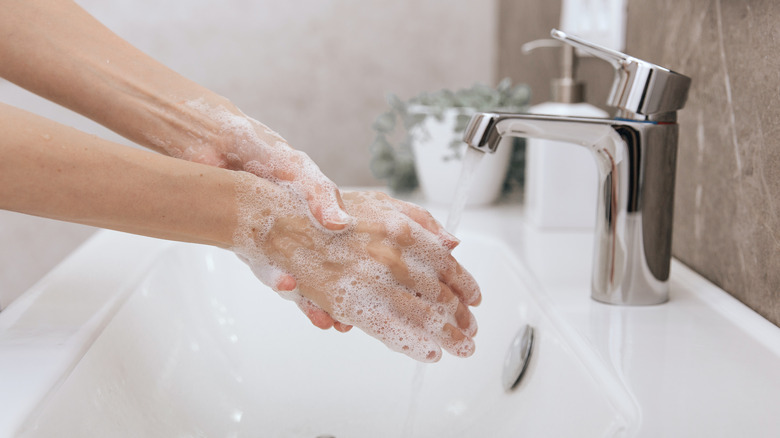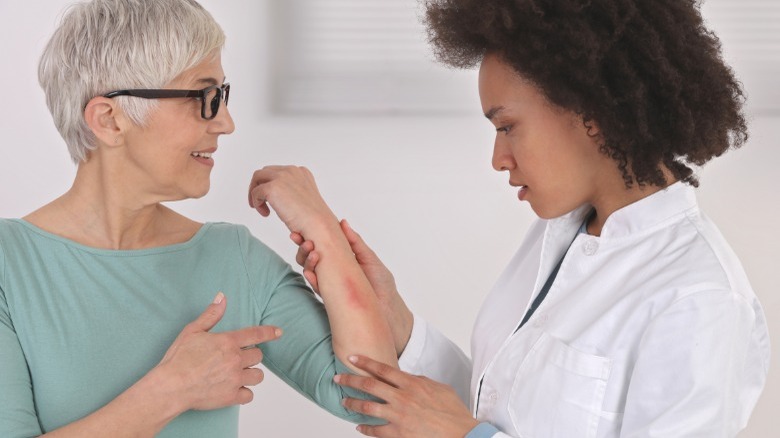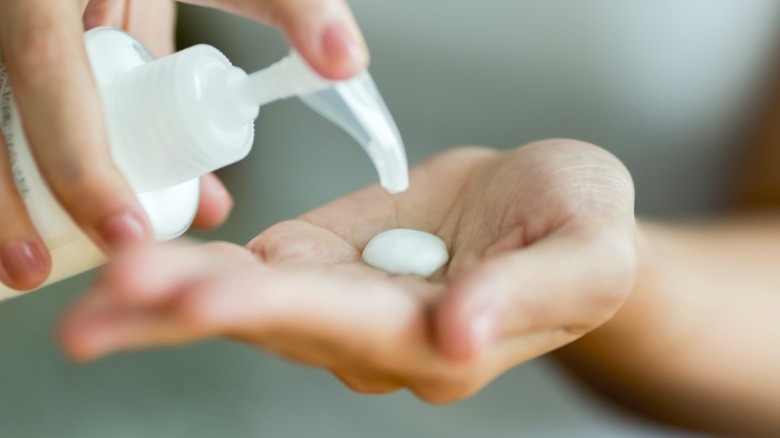What Is The Best Way To Wash Your Hands And Prevent Germs When You Have Eczema?
Approximately 31.6 million Americans — roughly 10% of the population — experience some form of eczema, a group of chronic skin conditions with various types of uncomfortable and sometimes painful symptoms that vary from mild to severe and cause embarrassment for many, per the National Eczema Association.
Beginning in childhood, we were instructed to wash our hands before eating or after touching something dirty. COVID-19 has made hand-washing and hand sanitizing that much more essential. But what if you have eczema? Is there a way to approach hand-washing to avoid discomfort?
Mark Levenberg, DO, FAAD, a board-certified Dermatologist and Senior Medical Director, U.S. Medical Affairs, at Pfizer Inc., explains in a Pfizer report that hand-washing is particularly important for eczema patients, as germs and infections can exacerbate the condition. However, the challenge is that handwashing, while helpful in preventing disease, can worsen eczema symptoms or trigger a flare-up through vigorous washing and hand-drying or insufficient moisturizing.
To avoid irritating the skin further, Dr. Levenberg stresses that eczema patients determine a comfortable hand-washing routine that includes washing with a gentle cleanser. Dr. Levenberg also advises sticking to lukewarm water, as hot or cold water could lead to further irritation. When drying, pat gently rather than rubbing. Air drying is as good as using a clean towel, but just make sure your hands are fully dry, as germs transfer more easily when hands are wet. Also, remember to moisturize immediately after with ointment or cream.
How eczema can affect the body
Eczema is a common skin condition that has been affecting humans for centuries. The chronic disease has been treated in one form or another since at least ancient Greece, when Hippocrates, "the father of modern medicine," documented itchy, scaly skin when treating one of his patients. Health experts believe Hippocrates reported what is known today as atopic eczema, per ATOPIKA.
Also known as atopic dermatitis, eczema is a chronic, non-contagious inflammatory skin condition that experts believe is caused by genetic factors, environmental conditions or an overactive immune system, according to the Cleveland Clinic. For instance, if you have eczema, your body may overreact to allergens in the environment such as smoke, skin products, detergents, and wool fibers. Consequently, your natural defense system kicks in, causing inflammation that leads to eczema symptoms. Initial symptoms typically include itchiness and dryness but can evolve into a rash or swelling.
Other common types of eczema besides atopic dermatitis include contact dermatitis and seborrheic dermatitis. Contact dermatitis occurs when your skin comes in contact with an irritant, organism, chemical, or pollutant and becomes irritated. Contact dermatitis usually appears as a bumpy patch of skin and can occur anywhere on your body. Closely associated with dandruff, seborrheic dermatitis is a skin condition that expresses itself as itchy red patches and greasy scales in combination with white powdery flakes. Seborrheic dermatitis is referred to as dandruff when it occurs on the scalp, however, it can also manifest elsewhere on the body.
Eczema treatments and flare-up prevention
The physicians at MU Health Care explain that eczema is not dangerous, but if left untreated it can lead to serious complications, so catching and managing eczema early is critical. Besides impacting your quality of life, eczema can lead to depression and sleep issues. More seriously, certain people with eczema may be more susceptible to bacteria and viruses, which can lead to life-threatening situations — and it's for this reason that hand washing is of particular importance.
To diagnose eczema, your doctor may conduct patch testing, where samples of different substances are applied to your skin. The area is then covered and your doctor looks for reactions within a few days. Based on the results it may become clear what type of allergy is causing eczema symptoms, according to the Mayo Clinic.
Treatment will vary depending on the individual case, but if the reaction is mild, your doctor may advise trying a certain moisturizer on a regular basis in combination with medicated creams and other treatments. Some medications you may be prescribed include antibiotics if you are experiencing an infection or medications to control inflammation, such as methotrexate or prednisone. To prevent flares, moisturize and take a warm bath or shower daily, avoid harsh soaps, manage stress, stay clear of rough, scratchy clothing, and use a humidifier to keep the air moist in your home, per the Mayo Clinic.



